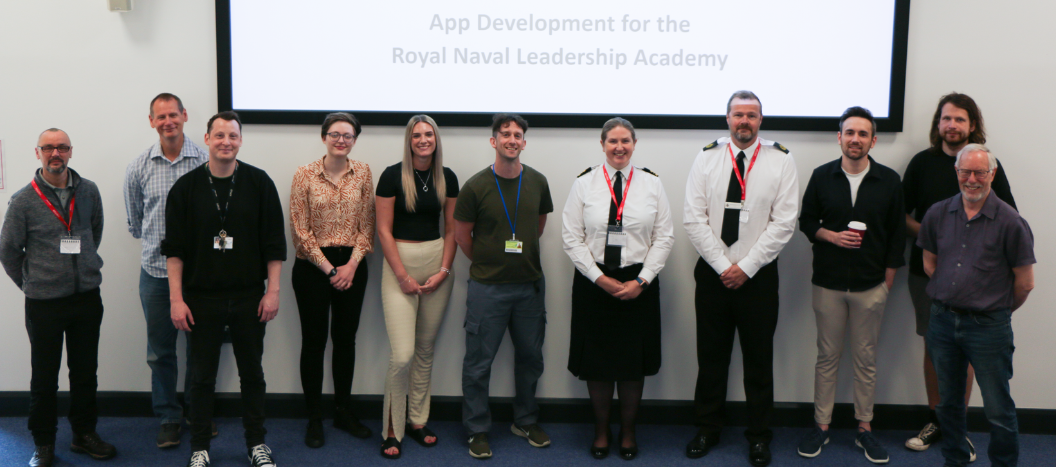
Software Development Students Develop Training App for the Royal Navy Leadership Academy
Students at Exeter College studying the Software Development in Apple Swift Programming Skills Bootcamp have developed an app for the Royal Navy Leadership Academy (RNLA). As part of the course students were set a live brief and allocated tasks which culminated in them presenting their app to the Royal Navy.
The brief was to simplify and digitise the marking and scoring system used in the RNLA when carrying out assessments in the field. Seven students worked on the project, they were all allocated tasks such as graphic design, navigation flow, and the data model.
Paul Barnard, Quality Assurance Chief for the Royal Navy Leadership Academy said;
“The brief was to digitise our marking scheme that we utilise in the Royal Navy Leadership Academy. We call it ORCE, which stands for observe, record, classify, evaluate. Currently its being done by paper, so instructors are out and about with students trying to write down in the wind, rain etc.
“This app will massively help the instructors. They will be able to standardise their reports as well as saving huge amounts of time. We’re quite set in our ways and thought some fresh ideas would help, it’s always better to have a variety of people looking into solving a problem as they all bring something else to the table.”
Speaking about the students work, he commented;
“What they have achieved in such a short amount of time is amazing. We weren’t expecting them to be this far down the track at all. Within 4 weeks they have produced a prototype with some really good ideas.
“We’re about 85% of the way there so the next step is to finish it, take some students out in the field so they can see how it’s used and the problems we encounter, and fine tune what they have already produced.”

Chloe Baker is one of the students working on the project. Her role was in designing the user interface and all the graphic design elements including the layouts of the screens and a colour scheme. She said;
“It’s been fed back today that the design is really in keeping with the Royal Navy brand, which is nice feedback to have. I think the thing I enjoyed the most about the course was knowing it was a real live brief that was going to be used within the RNLA. Knowing it will benefit people and knowing your contributing towards helping such a large organisation is great.”
She added;
“The bootcamp has really helped me with a good base of coding knowledge, coming into it having never written code. From the course I’ve learnt that I really enjoyed the user interface design and the graphic design side of the app development.”
The project came about when a previous student, who had studied on the Software Development Skills Bootcamp and then the Apple App Development Skills Bootcamp, reached out to the Navy via his innovation role at Capita. The Royal Navy recognised that this collaborative approach of working would benefit them and give students invaluable industry experience.
Chris Pegg, Apple Certified Educator at Exeter College, said;
“The students have just blown me away at the pace they have worked on the brief and how they have gelled as a team. They are all different ages (ranging from early 20’s to 75), and life backgrounds yet they have worked in unison and built lifelong friendships. For adult learning it’s so pivotal that the learning experience be cemented in real world examples – and what a lovely side product to have lifelong learning connections generated along the way.”
Speaking about the benefit of the students working on a live brief, Chris said;
“The benefit of this is not just so they complete something that is needed, but they get to work through real world problems. It gives them accessibility to problems that would develop naturally in industry, and not just in the classroom. It also builds upon soft skills like resilience, communication, independence, and collaboration, which are invaluable in tackling these challenges.”



